Employment Law: Dealing with an Employee Suspected with Cancer
VerifiedAdded on 2023/02/01
|15
|3407
|77
AI Summary
This study critically evaluates the provisions of employment law applicable to an employee suspected with cancer and provides advice and recommendations to the employer. It covers legal principles, rights and responsibilities, and the need for reasonable adjustments. The study emphasizes the importance of fair treatment and support for employees with disabilities.
Contribute Materials
Your contribution can guide someone’s learning journey. Share your
documents today.

Employment Law
Secure Best Marks with AI Grader
Need help grading? Try our AI Grader for instant feedback on your assignments.
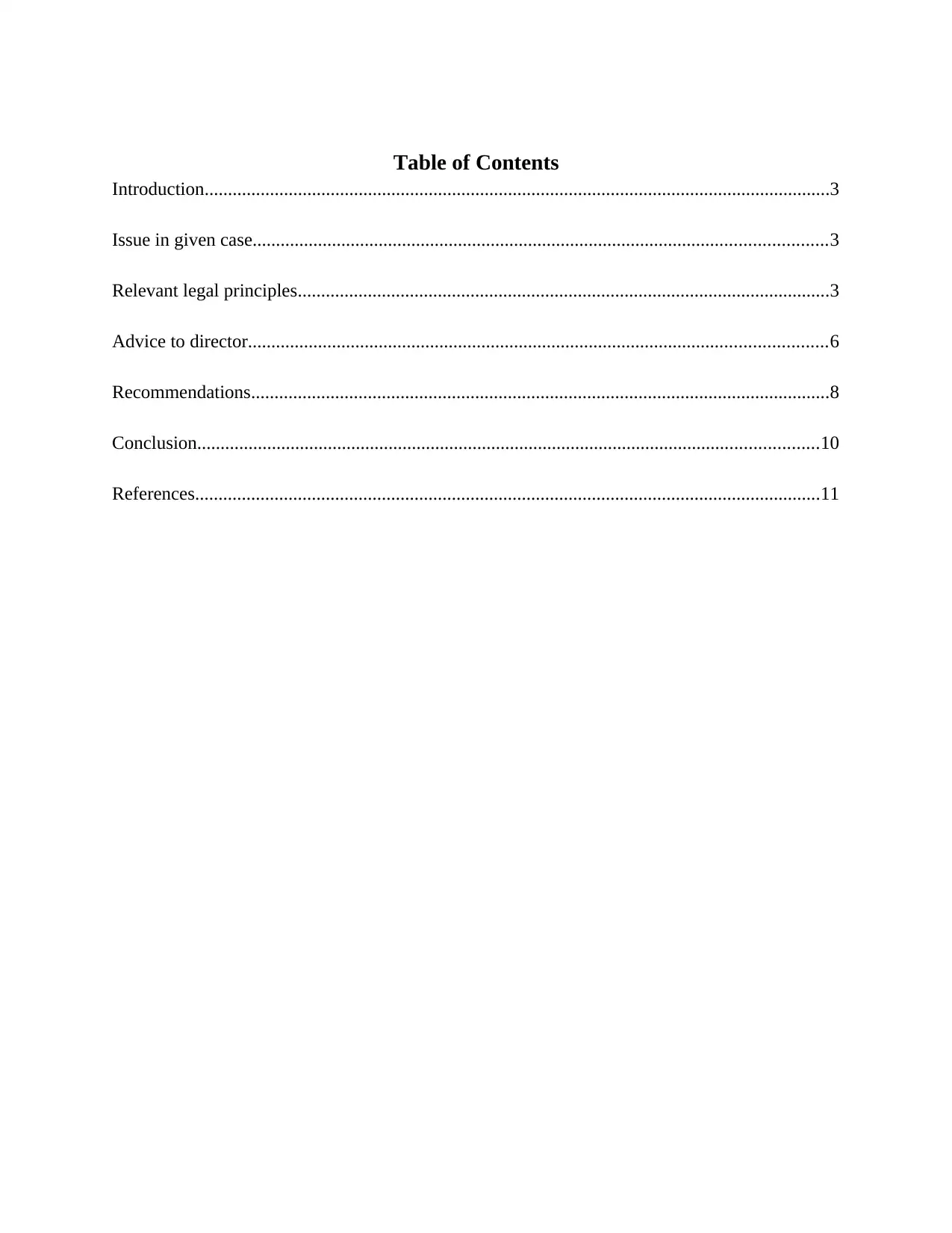
Table of Contents
Introduction......................................................................................................................................3
Issue in given case...........................................................................................................................3
Relevant legal principles..................................................................................................................3
Advice to director............................................................................................................................6
Recommendations............................................................................................................................8
Conclusion.....................................................................................................................................10
References......................................................................................................................................11
Introduction......................................................................................................................................3
Issue in given case...........................................................................................................................3
Relevant legal principles..................................................................................................................3
Advice to director............................................................................................................................6
Recommendations............................................................................................................................8
Conclusion.....................................................................................................................................10
References......................................................................................................................................11
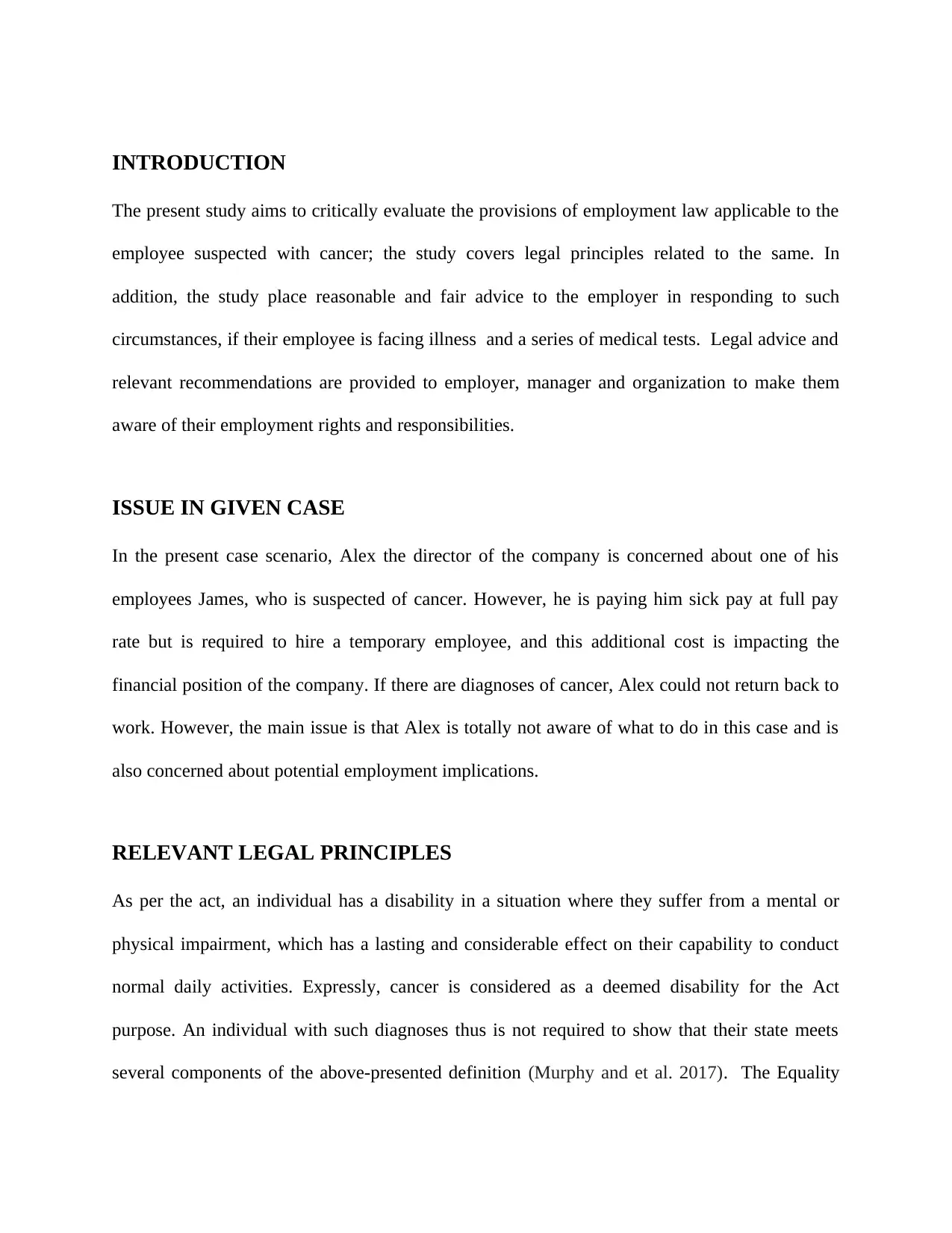
INTRODUCTION
The present study aims to critically evaluate the provisions of employment law applicable to the
employee suspected with cancer; the study covers legal principles related to the same. In
addition, the study place reasonable and fair advice to the employer in responding to such
circumstances, if their employee is facing illness and a series of medical tests. Legal advice and
relevant recommendations are provided to employer, manager and organization to make them
aware of their employment rights and responsibilities.
ISSUE IN GIVEN CASE
In the present case scenario, Alex the director of the company is concerned about one of his
employees James, who is suspected of cancer. However, he is paying him sick pay at full pay
rate but is required to hire a temporary employee, and this additional cost is impacting the
financial position of the company. If there are diagnoses of cancer, Alex could not return back to
work. However, the main issue is that Alex is totally not aware of what to do in this case and is
also concerned about potential employment implications.
RELEVANT LEGAL PRINCIPLES
As per the act, an individual has a disability in a situation where they suffer from a mental or
physical impairment, which has a lasting and considerable effect on their capability to conduct
normal daily activities. Expressly, cancer is considered as a deemed disability for the Act
purpose. An individual with such diagnoses thus is not required to show that their state meets
several components of the above-presented definition (Murphy and et al. 2017). The Equality
The present study aims to critically evaluate the provisions of employment law applicable to the
employee suspected with cancer; the study covers legal principles related to the same. In
addition, the study place reasonable and fair advice to the employer in responding to such
circumstances, if their employee is facing illness and a series of medical tests. Legal advice and
relevant recommendations are provided to employer, manager and organization to make them
aware of their employment rights and responsibilities.
ISSUE IN GIVEN CASE
In the present case scenario, Alex the director of the company is concerned about one of his
employees James, who is suspected of cancer. However, he is paying him sick pay at full pay
rate but is required to hire a temporary employee, and this additional cost is impacting the
financial position of the company. If there are diagnoses of cancer, Alex could not return back to
work. However, the main issue is that Alex is totally not aware of what to do in this case and is
also concerned about potential employment implications.
RELEVANT LEGAL PRINCIPLES
As per the act, an individual has a disability in a situation where they suffer from a mental or
physical impairment, which has a lasting and considerable effect on their capability to conduct
normal daily activities. Expressly, cancer is considered as a deemed disability for the Act
purpose. An individual with such diagnoses thus is not required to show that their state meets
several components of the above-presented definition (Murphy and et al. 2017). The Equality
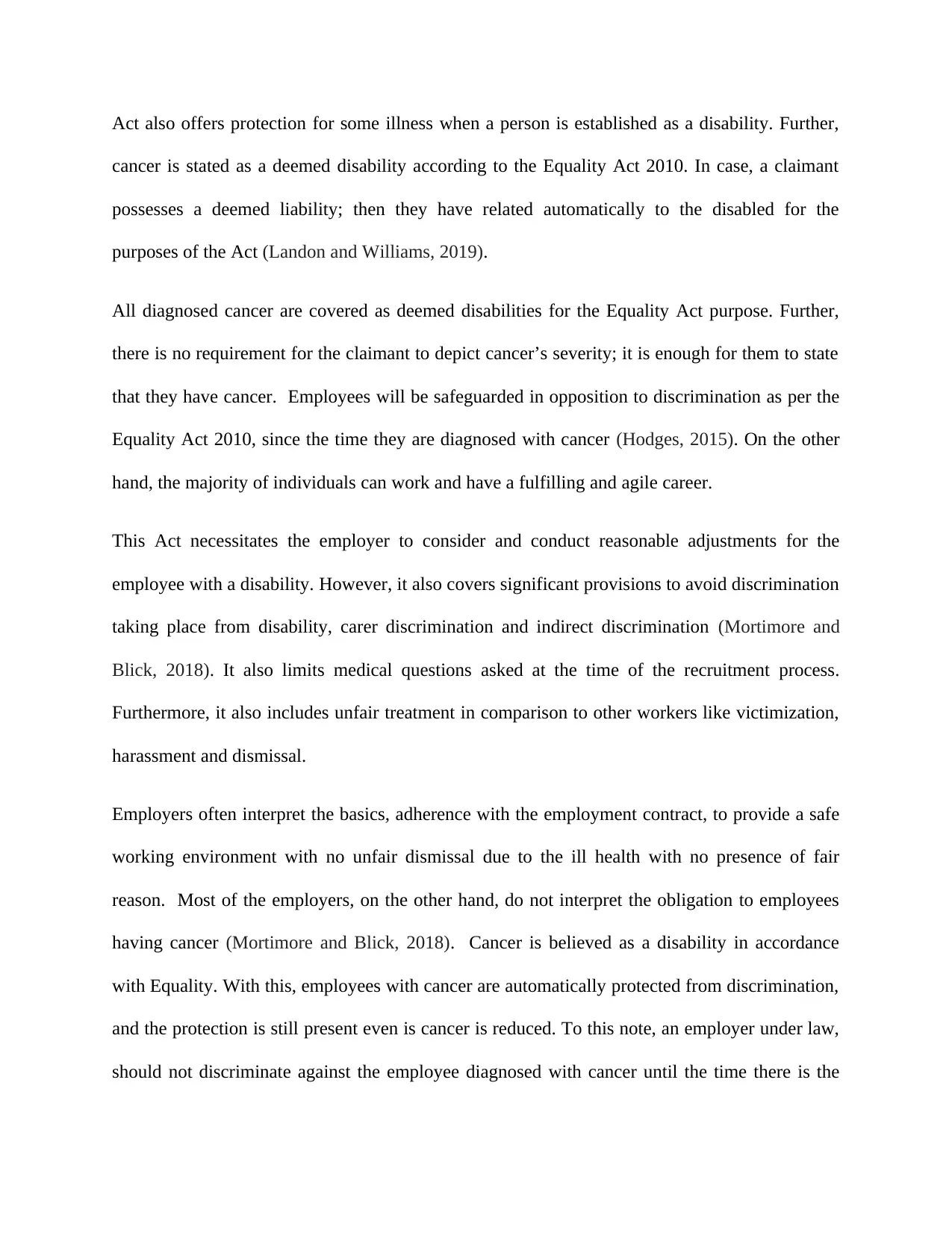
Act also offers protection for some illness when a person is established as a disability. Further,
cancer is stated as a deemed disability according to the Equality Act 2010. In case, a claimant
possesses a deemed liability; then they have related automatically to the disabled for the
purposes of the Act (Landon and Williams, 2019).
All diagnosed cancer are covered as deemed disabilities for the Equality Act purpose. Further,
there is no requirement for the claimant to depict cancer’s severity; it is enough for them to state
that they have cancer. Employees will be safeguarded in opposition to discrimination as per the
Equality Act 2010, since the time they are diagnosed with cancer (Hodges, 2015). On the other
hand, the majority of individuals can work and have a fulfilling and agile career.
This Act necessitates the employer to consider and conduct reasonable adjustments for the
employee with a disability. However, it also covers significant provisions to avoid discrimination
taking place from disability, carer discrimination and indirect discrimination (Mortimore and
Blick, 2018). It also limits medical questions asked at the time of the recruitment process.
Furthermore, it also includes unfair treatment in comparison to other workers like victimization,
harassment and dismissal.
Employers often interpret the basics, adherence with the employment contract, to provide a safe
working environment with no unfair dismissal due to the ill health with no presence of fair
reason. Most of the employers, on the other hand, do not interpret the obligation to employees
having cancer (Mortimore and Blick, 2018). Cancer is believed as a disability in accordance
with Equality. With this, employees with cancer are automatically protected from discrimination,
and the protection is still present even is cancer is reduced. To this note, an employer under law,
should not discriminate against the employee diagnosed with cancer until the time there is the
cancer is stated as a deemed disability according to the Equality Act 2010. In case, a claimant
possesses a deemed liability; then they have related automatically to the disabled for the
purposes of the Act (Landon and Williams, 2019).
All diagnosed cancer are covered as deemed disabilities for the Equality Act purpose. Further,
there is no requirement for the claimant to depict cancer’s severity; it is enough for them to state
that they have cancer. Employees will be safeguarded in opposition to discrimination as per the
Equality Act 2010, since the time they are diagnosed with cancer (Hodges, 2015). On the other
hand, the majority of individuals can work and have a fulfilling and agile career.
This Act necessitates the employer to consider and conduct reasonable adjustments for the
employee with a disability. However, it also covers significant provisions to avoid discrimination
taking place from disability, carer discrimination and indirect discrimination (Mortimore and
Blick, 2018). It also limits medical questions asked at the time of the recruitment process.
Furthermore, it also includes unfair treatment in comparison to other workers like victimization,
harassment and dismissal.
Employers often interpret the basics, adherence with the employment contract, to provide a safe
working environment with no unfair dismissal due to the ill health with no presence of fair
reason. Most of the employers, on the other hand, do not interpret the obligation to employees
having cancer (Mortimore and Blick, 2018). Cancer is believed as a disability in accordance
with Equality. With this, employees with cancer are automatically protected from discrimination,
and the protection is still present even is cancer is reduced. To this note, an employer under law,
should not discriminate against the employee diagnosed with cancer until the time there is the
Secure Best Marks with AI Grader
Need help grading? Try our AI Grader for instant feedback on your assignments.
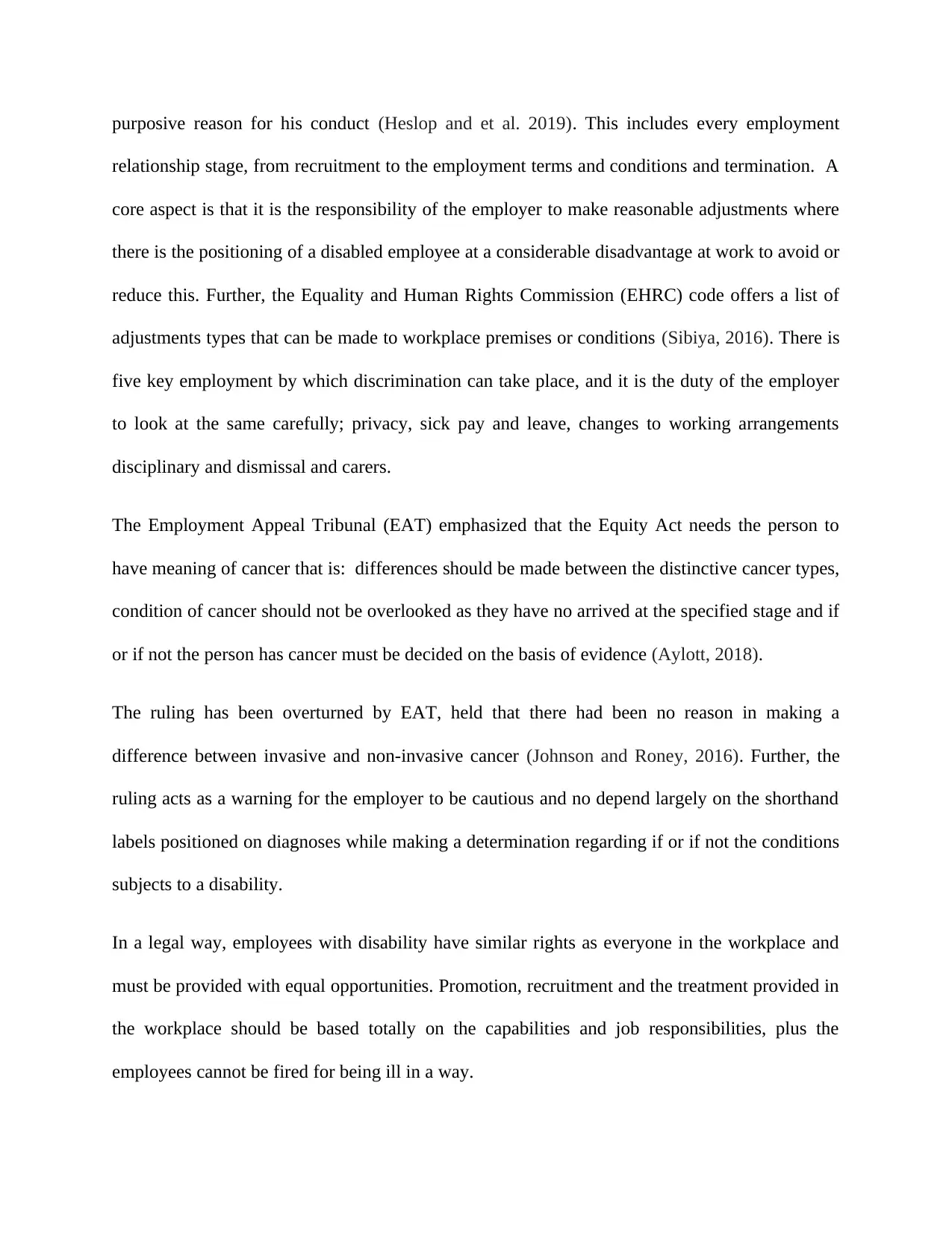
purposive reason for his conduct (Heslop and et al. 2019). This includes every employment
relationship stage, from recruitment to the employment terms and conditions and termination. A
core aspect is that it is the responsibility of the employer to make reasonable adjustments where
there is the positioning of a disabled employee at a considerable disadvantage at work to avoid or
reduce this. Further, the Equality and Human Rights Commission (EHRC) code offers a list of
adjustments types that can be made to workplace premises or conditions (Sibiya, 2016). There is
five key employment by which discrimination can take place, and it is the duty of the employer
to look at the same carefully; privacy, sick pay and leave, changes to working arrangements
disciplinary and dismissal and carers.
The Employment Appeal Tribunal (EAT) emphasized that the Equity Act needs the person to
have meaning of cancer that is: differences should be made between the distinctive cancer types,
condition of cancer should not be overlooked as they have no arrived at the specified stage and if
or if not the person has cancer must be decided on the basis of evidence (Aylott, 2018).
The ruling has been overturned by EAT, held that there had been no reason in making a
difference between invasive and non-invasive cancer (Johnson and Roney, 2016). Further, the
ruling acts as a warning for the employer to be cautious and no depend largely on the shorthand
labels positioned on diagnoses while making a determination regarding if or if not the conditions
subjects to a disability.
In a legal way, employees with disability have similar rights as everyone in the workplace and
must be provided with equal opportunities. Promotion, recruitment and the treatment provided in
the workplace should be based totally on the capabilities and job responsibilities, plus the
employees cannot be fired for being ill in a way.
relationship stage, from recruitment to the employment terms and conditions and termination. A
core aspect is that it is the responsibility of the employer to make reasonable adjustments where
there is the positioning of a disabled employee at a considerable disadvantage at work to avoid or
reduce this. Further, the Equality and Human Rights Commission (EHRC) code offers a list of
adjustments types that can be made to workplace premises or conditions (Sibiya, 2016). There is
five key employment by which discrimination can take place, and it is the duty of the employer
to look at the same carefully; privacy, sick pay and leave, changes to working arrangements
disciplinary and dismissal and carers.
The Employment Appeal Tribunal (EAT) emphasized that the Equity Act needs the person to
have meaning of cancer that is: differences should be made between the distinctive cancer types,
condition of cancer should not be overlooked as they have no arrived at the specified stage and if
or if not the person has cancer must be decided on the basis of evidence (Aylott, 2018).
The ruling has been overturned by EAT, held that there had been no reason in making a
difference between invasive and non-invasive cancer (Johnson and Roney, 2016). Further, the
ruling acts as a warning for the employer to be cautious and no depend largely on the shorthand
labels positioned on diagnoses while making a determination regarding if or if not the conditions
subjects to a disability.
In a legal way, employees with disability have similar rights as everyone in the workplace and
must be provided with equal opportunities. Promotion, recruitment and the treatment provided in
the workplace should be based totally on the capabilities and job responsibilities, plus the
employees cannot be fired for being ill in a way.
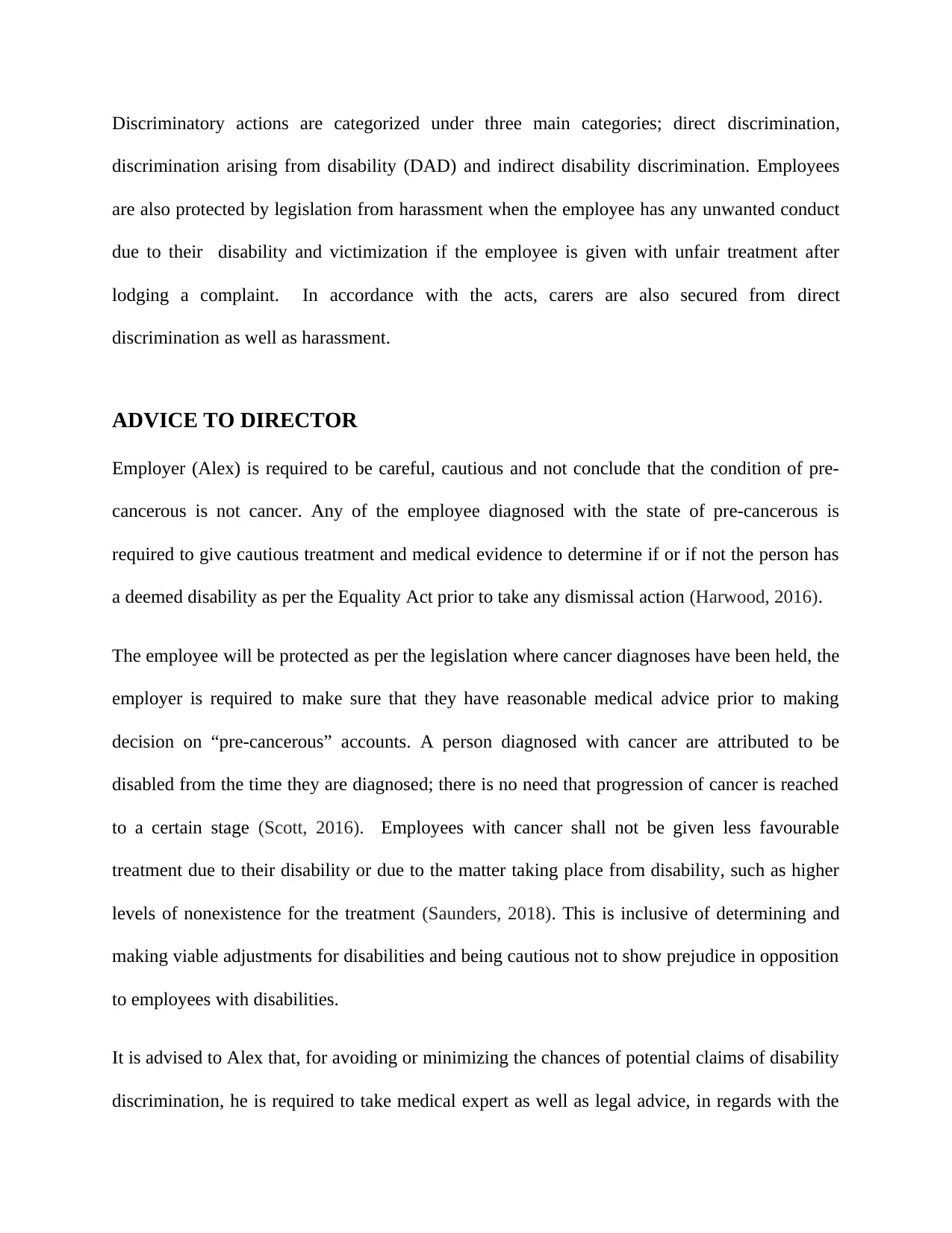
Discriminatory actions are categorized under three main categories; direct discrimination,
discrimination arising from disability (DAD) and indirect disability discrimination. Employees
are also protected by legislation from harassment when the employee has any unwanted conduct
due to their disability and victimization if the employee is given with unfair treatment after
lodging a complaint. In accordance with the acts, carers are also secured from direct
discrimination as well as harassment.
ADVICE TO DIRECTOR
Employer (Alex) is required to be careful, cautious and not conclude that the condition of pre-
cancerous is not cancer. Any of the employee diagnosed with the state of pre-cancerous is
required to give cautious treatment and medical evidence to determine if or if not the person has
a deemed disability as per the Equality Act prior to take any dismissal action (Harwood, 2016).
The employee will be protected as per the legislation where cancer diagnoses have been held, the
employer is required to make sure that they have reasonable medical advice prior to making
decision on “pre-cancerous” accounts. A person diagnosed with cancer are attributed to be
disabled from the time they are diagnosed; there is no need that progression of cancer is reached
to a certain stage (Scott, 2016). Employees with cancer shall not be given less favourable
treatment due to their disability or due to the matter taking place from disability, such as higher
levels of nonexistence for the treatment (Saunders, 2018). This is inclusive of determining and
making viable adjustments for disabilities and being cautious not to show prejudice in opposition
to employees with disabilities.
It is advised to Alex that, for avoiding or minimizing the chances of potential claims of disability
discrimination, he is required to take medical expert as well as legal advice, in regards with the
discrimination arising from disability (DAD) and indirect disability discrimination. Employees
are also protected by legislation from harassment when the employee has any unwanted conduct
due to their disability and victimization if the employee is given with unfair treatment after
lodging a complaint. In accordance with the acts, carers are also secured from direct
discrimination as well as harassment.
ADVICE TO DIRECTOR
Employer (Alex) is required to be careful, cautious and not conclude that the condition of pre-
cancerous is not cancer. Any of the employee diagnosed with the state of pre-cancerous is
required to give cautious treatment and medical evidence to determine if or if not the person has
a deemed disability as per the Equality Act prior to take any dismissal action (Harwood, 2016).
The employee will be protected as per the legislation where cancer diagnoses have been held, the
employer is required to make sure that they have reasonable medical advice prior to making
decision on “pre-cancerous” accounts. A person diagnosed with cancer are attributed to be
disabled from the time they are diagnosed; there is no need that progression of cancer is reached
to a certain stage (Scott, 2016). Employees with cancer shall not be given less favourable
treatment due to their disability or due to the matter taking place from disability, such as higher
levels of nonexistence for the treatment (Saunders, 2018). This is inclusive of determining and
making viable adjustments for disabilities and being cautious not to show prejudice in opposition
to employees with disabilities.
It is advised to Alex that, for avoiding or minimizing the chances of potential claims of disability
discrimination, he is required to take medical expert as well as legal advice, in regards with the
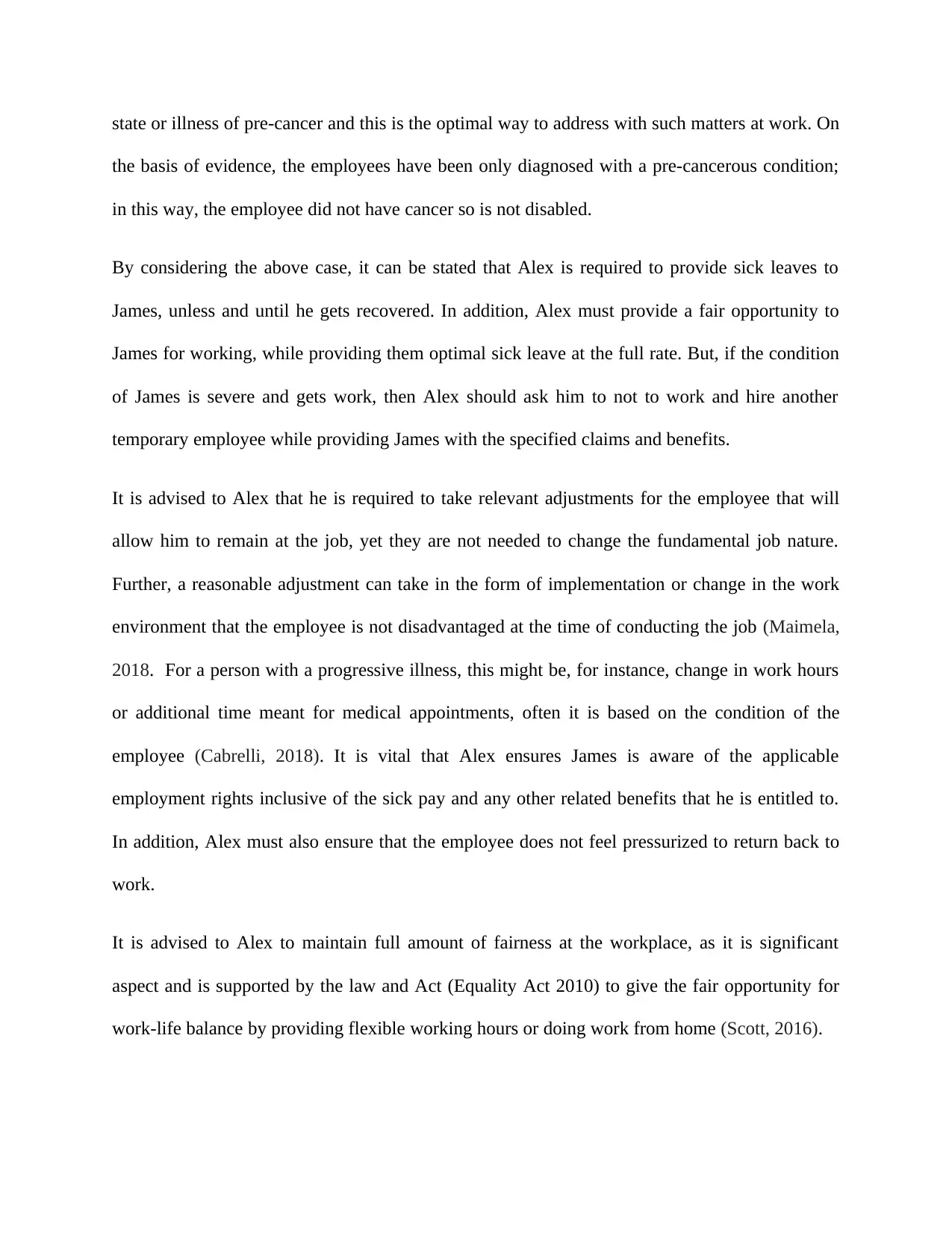
state or illness of pre-cancer and this is the optimal way to address with such matters at work. On
the basis of evidence, the employees have been only diagnosed with a pre-cancerous condition;
in this way, the employee did not have cancer so is not disabled.
By considering the above case, it can be stated that Alex is required to provide sick leaves to
James, unless and until he gets recovered. In addition, Alex must provide a fair opportunity to
James for working, while providing them optimal sick leave at the full rate. But, if the condition
of James is severe and gets work, then Alex should ask him to not to work and hire another
temporary employee while providing James with the specified claims and benefits.
It is advised to Alex that he is required to take relevant adjustments for the employee that will
allow him to remain at the job, yet they are not needed to change the fundamental job nature.
Further, a reasonable adjustment can take in the form of implementation or change in the work
environment that the employee is not disadvantaged at the time of conducting the job (Maimela,
2018. For a person with a progressive illness, this might be, for instance, change in work hours
or additional time meant for medical appointments, often it is based on the condition of the
employee (Cabrelli, 2018). It is vital that Alex ensures James is aware of the applicable
employment rights inclusive of the sick pay and any other related benefits that he is entitled to.
In addition, Alex must also ensure that the employee does not feel pressurized to return back to
work.
It is advised to Alex to maintain full amount of fairness at the workplace, as it is significant
aspect and is supported by the law and Act (Equality Act 2010) to give the fair opportunity for
work-life balance by providing flexible working hours or doing work from home (Scott, 2016).
the basis of evidence, the employees have been only diagnosed with a pre-cancerous condition;
in this way, the employee did not have cancer so is not disabled.
By considering the above case, it can be stated that Alex is required to provide sick leaves to
James, unless and until he gets recovered. In addition, Alex must provide a fair opportunity to
James for working, while providing them optimal sick leave at the full rate. But, if the condition
of James is severe and gets work, then Alex should ask him to not to work and hire another
temporary employee while providing James with the specified claims and benefits.
It is advised to Alex that he is required to take relevant adjustments for the employee that will
allow him to remain at the job, yet they are not needed to change the fundamental job nature.
Further, a reasonable adjustment can take in the form of implementation or change in the work
environment that the employee is not disadvantaged at the time of conducting the job (Maimela,
2018. For a person with a progressive illness, this might be, for instance, change in work hours
or additional time meant for medical appointments, often it is based on the condition of the
employee (Cabrelli, 2018). It is vital that Alex ensures James is aware of the applicable
employment rights inclusive of the sick pay and any other related benefits that he is entitled to.
In addition, Alex must also ensure that the employee does not feel pressurized to return back to
work.
It is advised to Alex to maintain full amount of fairness at the workplace, as it is significant
aspect and is supported by the law and Act (Equality Act 2010) to give the fair opportunity for
work-life balance by providing flexible working hours or doing work from home (Scott, 2016).
Paraphrase This Document
Need a fresh take? Get an instant paraphrase of this document with our AI Paraphraser
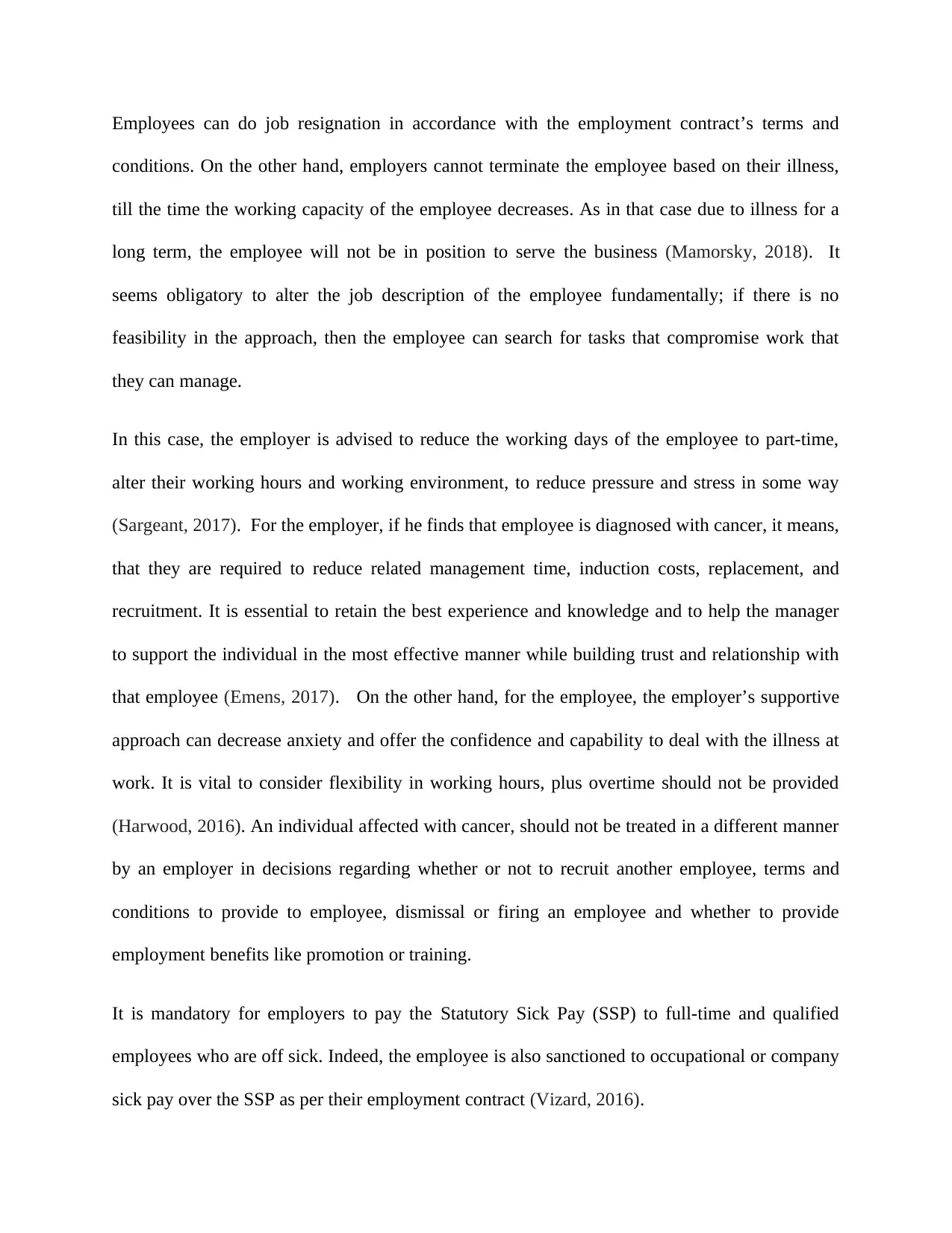
Employees can do job resignation in accordance with the employment contract’s terms and
conditions. On the other hand, employers cannot terminate the employee based on their illness,
till the time the working capacity of the employee decreases. As in that case due to illness for a
long term, the employee will not be in position to serve the business (Mamorsky, 2018). It
seems obligatory to alter the job description of the employee fundamentally; if there is no
feasibility in the approach, then the employee can search for tasks that compromise work that
they can manage.
In this case, the employer is advised to reduce the working days of the employee to part-time,
alter their working hours and working environment, to reduce pressure and stress in some way
(Sargeant, 2017). For the employer, if he finds that employee is diagnosed with cancer, it means,
that they are required to reduce related management time, induction costs, replacement, and
recruitment. It is essential to retain the best experience and knowledge and to help the manager
to support the individual in the most effective manner while building trust and relationship with
that employee (Emens, 2017). On the other hand, for the employee, the employer’s supportive
approach can decrease anxiety and offer the confidence and capability to deal with the illness at
work. It is vital to consider flexibility in working hours, plus overtime should not be provided
(Harwood, 2016). An individual affected with cancer, should not be treated in a different manner
by an employer in decisions regarding whether or not to recruit another employee, terms and
conditions to provide to employee, dismissal or firing an employee and whether to provide
employment benefits like promotion or training.
It is mandatory for employers to pay the Statutory Sick Pay (SSP) to full-time and qualified
employees who are off sick. Indeed, the employee is also sanctioned to occupational or company
sick pay over the SSP as per their employment contract (Vizard, 2016).
conditions. On the other hand, employers cannot terminate the employee based on their illness,
till the time the working capacity of the employee decreases. As in that case due to illness for a
long term, the employee will not be in position to serve the business (Mamorsky, 2018). It
seems obligatory to alter the job description of the employee fundamentally; if there is no
feasibility in the approach, then the employee can search for tasks that compromise work that
they can manage.
In this case, the employer is advised to reduce the working days of the employee to part-time,
alter their working hours and working environment, to reduce pressure and stress in some way
(Sargeant, 2017). For the employer, if he finds that employee is diagnosed with cancer, it means,
that they are required to reduce related management time, induction costs, replacement, and
recruitment. It is essential to retain the best experience and knowledge and to help the manager
to support the individual in the most effective manner while building trust and relationship with
that employee (Emens, 2017). On the other hand, for the employee, the employer’s supportive
approach can decrease anxiety and offer the confidence and capability to deal with the illness at
work. It is vital to consider flexibility in working hours, plus overtime should not be provided
(Harwood, 2016). An individual affected with cancer, should not be treated in a different manner
by an employer in decisions regarding whether or not to recruit another employee, terms and
conditions to provide to employee, dismissal or firing an employee and whether to provide
employment benefits like promotion or training.
It is mandatory for employers to pay the Statutory Sick Pay (SSP) to full-time and qualified
employees who are off sick. Indeed, the employee is also sanctioned to occupational or company
sick pay over the SSP as per their employment contract (Vizard, 2016).
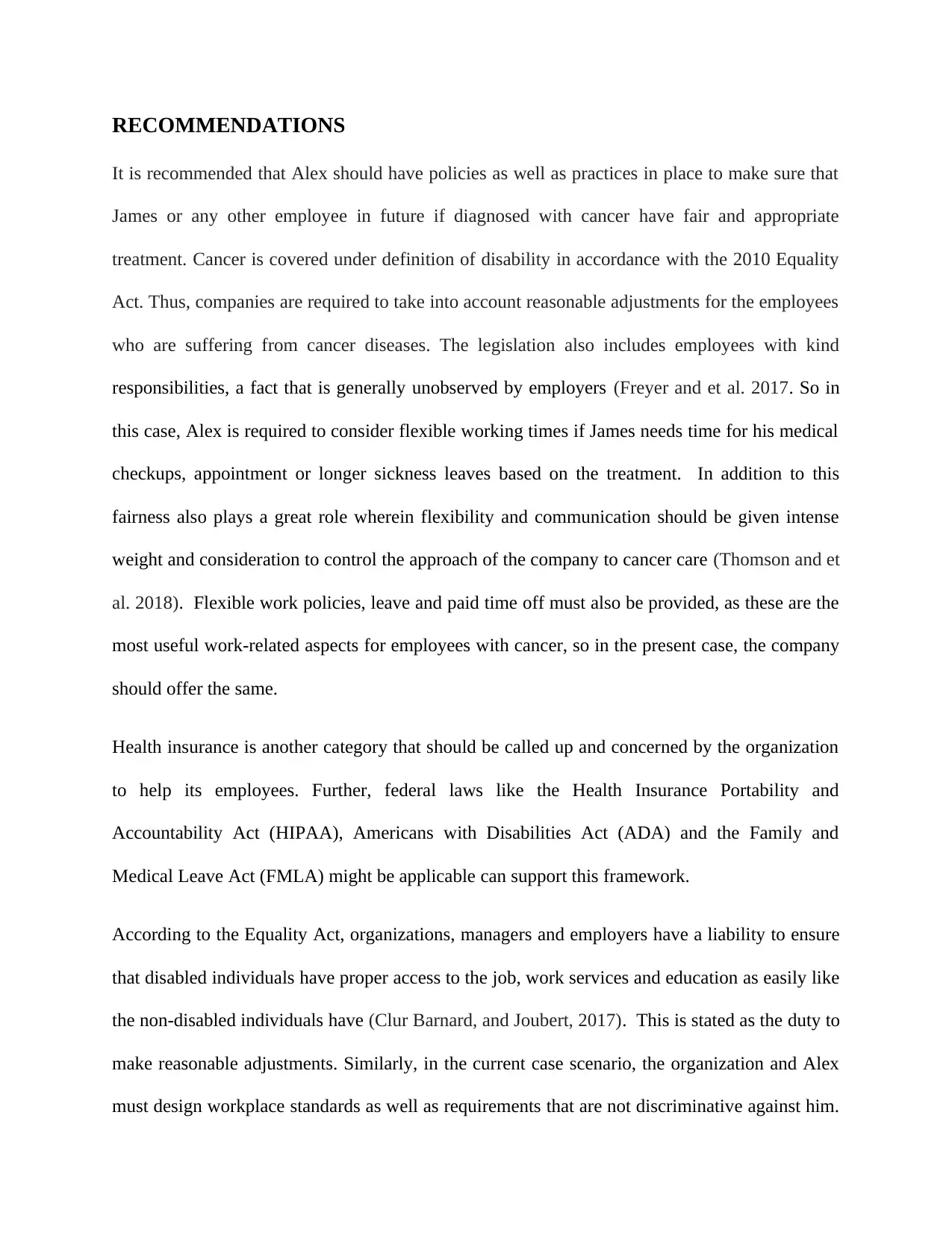
RECOMMENDATIONS
It is recommended that Alex should have policies as well as practices in place to make sure that
James or any other employee in future if diagnosed with cancer have fair and appropriate
treatment. Cancer is covered under definition of disability in accordance with the 2010 Equality
Act. Thus, companies are required to take into account reasonable adjustments for the employees
who are suffering from cancer diseases. The legislation also includes employees with kind
responsibilities, a fact that is generally unobserved by employers (Freyer and et al. 2017. So in
this case, Alex is required to consider flexible working times if James needs time for his medical
checkups, appointment or longer sickness leaves based on the treatment. In addition to this
fairness also plays a great role wherein flexibility and communication should be given intense
weight and consideration to control the approach of the company to cancer care (Thomson and et
al. 2018). Flexible work policies, leave and paid time off must also be provided, as these are the
most useful work-related aspects for employees with cancer, so in the present case, the company
should offer the same.
Health insurance is another category that should be called up and concerned by the organization
to help its employees. Further, federal laws like the Health Insurance Portability and
Accountability Act (HIPAA), Americans with Disabilities Act (ADA) and the Family and
Medical Leave Act (FMLA) might be applicable can support this framework.
According to the Equality Act, organizations, managers and employers have a liability to ensure
that disabled individuals have proper access to the job, work services and education as easily like
the non-disabled individuals have (Clur Barnard, and Joubert, 2017). This is stated as the duty to
make reasonable adjustments. Similarly, in the current case scenario, the organization and Alex
must design workplace standards as well as requirements that are not discriminative against him.
It is recommended that Alex should have policies as well as practices in place to make sure that
James or any other employee in future if diagnosed with cancer have fair and appropriate
treatment. Cancer is covered under definition of disability in accordance with the 2010 Equality
Act. Thus, companies are required to take into account reasonable adjustments for the employees
who are suffering from cancer diseases. The legislation also includes employees with kind
responsibilities, a fact that is generally unobserved by employers (Freyer and et al. 2017. So in
this case, Alex is required to consider flexible working times if James needs time for his medical
checkups, appointment or longer sickness leaves based on the treatment. In addition to this
fairness also plays a great role wherein flexibility and communication should be given intense
weight and consideration to control the approach of the company to cancer care (Thomson and et
al. 2018). Flexible work policies, leave and paid time off must also be provided, as these are the
most useful work-related aspects for employees with cancer, so in the present case, the company
should offer the same.
Health insurance is another category that should be called up and concerned by the organization
to help its employees. Further, federal laws like the Health Insurance Portability and
Accountability Act (HIPAA), Americans with Disabilities Act (ADA) and the Family and
Medical Leave Act (FMLA) might be applicable can support this framework.
According to the Equality Act, organizations, managers and employers have a liability to ensure
that disabled individuals have proper access to the job, work services and education as easily like
the non-disabled individuals have (Clur Barnard, and Joubert, 2017). This is stated as the duty to
make reasonable adjustments. Similarly, in the current case scenario, the organization and Alex
must design workplace standards as well as requirements that are not discriminative against him.
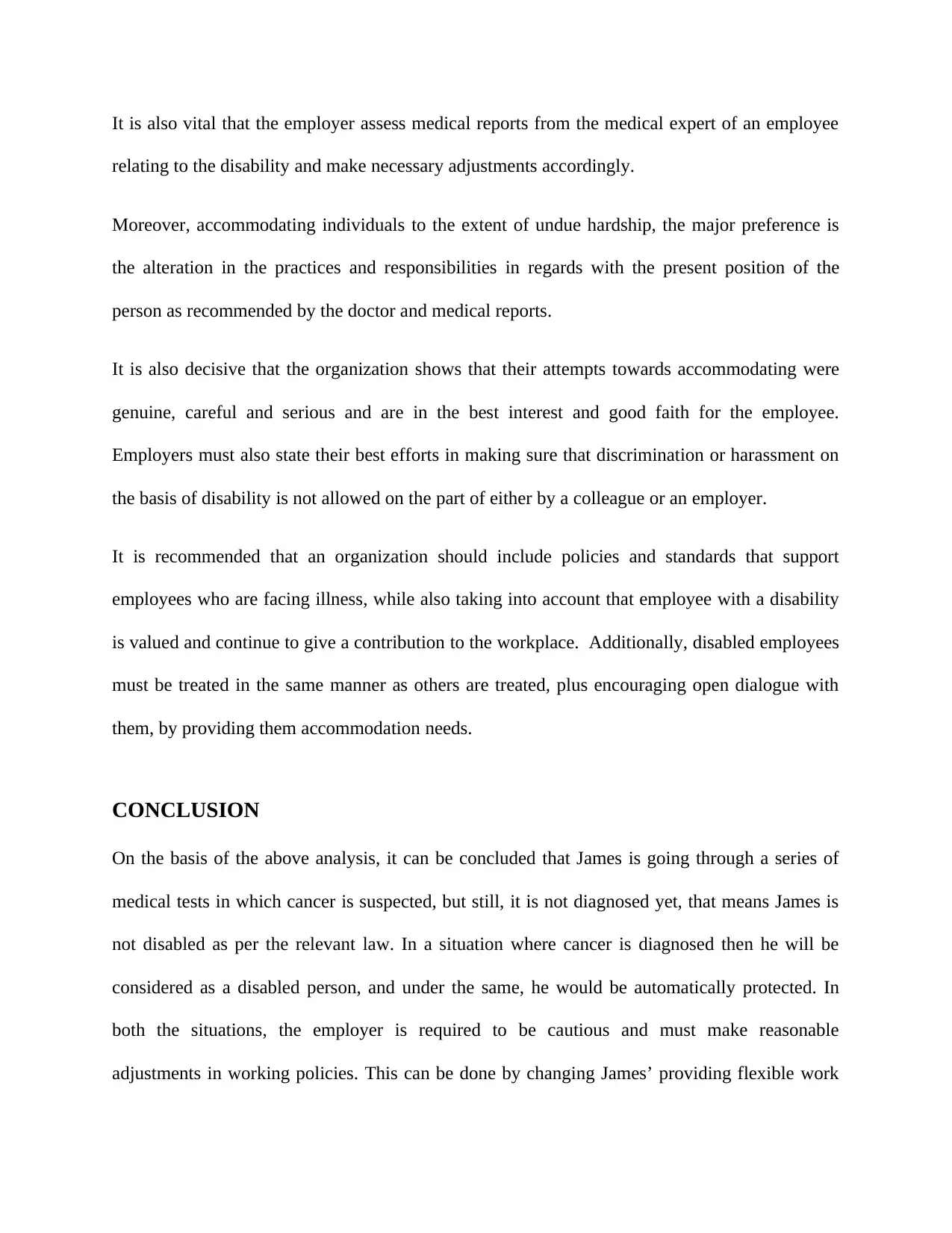
It is also vital that the employer assess medical reports from the medical expert of an employee
relating to the disability and make necessary adjustments accordingly.
Moreover, accommodating individuals to the extent of undue hardship, the major preference is
the alteration in the practices and responsibilities in regards with the present position of the
person as recommended by the doctor and medical reports.
It is also decisive that the organization shows that their attempts towards accommodating were
genuine, careful and serious and are in the best interest and good faith for the employee.
Employers must also state their best efforts in making sure that discrimination or harassment on
the basis of disability is not allowed on the part of either by a colleague or an employer.
It is recommended that an organization should include policies and standards that support
employees who are facing illness, while also taking into account that employee with a disability
is valued and continue to give a contribution to the workplace. Additionally, disabled employees
must be treated in the same manner as others are treated, plus encouraging open dialogue with
them, by providing them accommodation needs.
CONCLUSION
On the basis of the above analysis, it can be concluded that James is going through a series of
medical tests in which cancer is suspected, but still, it is not diagnosed yet, that means James is
not disabled as per the relevant law. In a situation where cancer is diagnosed then he will be
considered as a disabled person, and under the same, he would be automatically protected. In
both the situations, the employer is required to be cautious and must make reasonable
adjustments in working policies. This can be done by changing James’ providing flexible work
relating to the disability and make necessary adjustments accordingly.
Moreover, accommodating individuals to the extent of undue hardship, the major preference is
the alteration in the practices and responsibilities in regards with the present position of the
person as recommended by the doctor and medical reports.
It is also decisive that the organization shows that their attempts towards accommodating were
genuine, careful and serious and are in the best interest and good faith for the employee.
Employers must also state their best efforts in making sure that discrimination or harassment on
the basis of disability is not allowed on the part of either by a colleague or an employer.
It is recommended that an organization should include policies and standards that support
employees who are facing illness, while also taking into account that employee with a disability
is valued and continue to give a contribution to the workplace. Additionally, disabled employees
must be treated in the same manner as others are treated, plus encouraging open dialogue with
them, by providing them accommodation needs.
CONCLUSION
On the basis of the above analysis, it can be concluded that James is going through a series of
medical tests in which cancer is suspected, but still, it is not diagnosed yet, that means James is
not disabled as per the relevant law. In a situation where cancer is diagnosed then he will be
considered as a disabled person, and under the same, he would be automatically protected. In
both the situations, the employer is required to be cautious and must make reasonable
adjustments in working policies. This can be done by changing James’ providing flexible work
Secure Best Marks with AI Grader
Need help grading? Try our AI Grader for instant feedback on your assignments.

environment and being supportive and fair, while providing him with sick leave at the full rate.
On the other hand, if James is not in a condition to work, then Alex must hire another employee
in place, and provide James with specified claims, insurance and benefits under their
employment contract.
On the other hand, if James is not in a condition to work, then Alex must hire another employee
in place, and provide James with specified claims, insurance and benefits under their
employment contract.

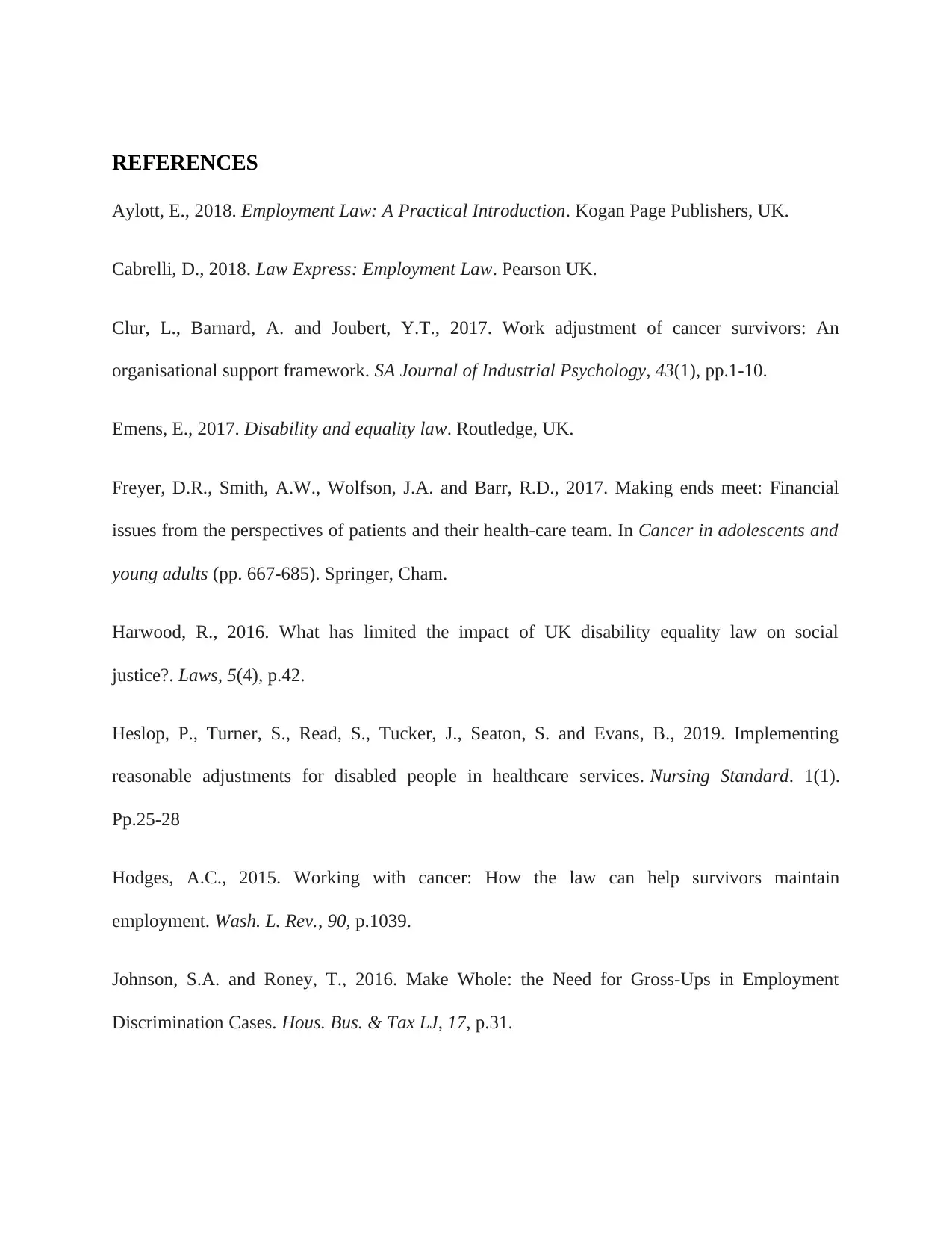
REFERENCES
Aylott, E., 2018. Employment Law: A Practical Introduction. Kogan Page Publishers, UK.
Cabrelli, D., 2018. Law Express: Employment Law. Pearson UK.
Clur, L., Barnard, A. and Joubert, Y.T., 2017. Work adjustment of cancer survivors: An
organisational support framework. SA Journal of Industrial Psychology, 43(1), pp.1-10.
Emens, E., 2017. Disability and equality law. Routledge, UK.
Freyer, D.R., Smith, A.W., Wolfson, J.A. and Barr, R.D., 2017. Making ends meet: Financial
issues from the perspectives of patients and their health-care team. In Cancer in adolescents and
young adults (pp. 667-685). Springer, Cham.
Harwood, R., 2016. What has limited the impact of UK disability equality law on social
justice?. Laws, 5(4), p.42.
Heslop, P., Turner, S., Read, S., Tucker, J., Seaton, S. and Evans, B., 2019. Implementing
reasonable adjustments for disabled people in healthcare services. Nursing Standard. 1(1).
Pp.25-28
Hodges, A.C., 2015. Working with cancer: How the law can help survivors maintain
employment. Wash. L. Rev., 90, p.1039.
Johnson, S.A. and Roney, T., 2016. Make Whole: the Need for Gross-Ups in Employment
Discrimination Cases. Hous. Bus. & Tax LJ, 17, p.31.
Aylott, E., 2018. Employment Law: A Practical Introduction. Kogan Page Publishers, UK.
Cabrelli, D., 2018. Law Express: Employment Law. Pearson UK.
Clur, L., Barnard, A. and Joubert, Y.T., 2017. Work adjustment of cancer survivors: An
organisational support framework. SA Journal of Industrial Psychology, 43(1), pp.1-10.
Emens, E., 2017. Disability and equality law. Routledge, UK.
Freyer, D.R., Smith, A.W., Wolfson, J.A. and Barr, R.D., 2017. Making ends meet: Financial
issues from the perspectives of patients and their health-care team. In Cancer in adolescents and
young adults (pp. 667-685). Springer, Cham.
Harwood, R., 2016. What has limited the impact of UK disability equality law on social
justice?. Laws, 5(4), p.42.
Heslop, P., Turner, S., Read, S., Tucker, J., Seaton, S. and Evans, B., 2019. Implementing
reasonable adjustments for disabled people in healthcare services. Nursing Standard. 1(1).
Pp.25-28
Hodges, A.C., 2015. Working with cancer: How the law can help survivors maintain
employment. Wash. L. Rev., 90, p.1039.
Johnson, S.A. and Roney, T., 2016. Make Whole: the Need for Gross-Ups in Employment
Discrimination Cases. Hous. Bus. & Tax LJ, 17, p.31.
Paraphrase This Document
Need a fresh take? Get an instant paraphrase of this document with our AI Paraphraser
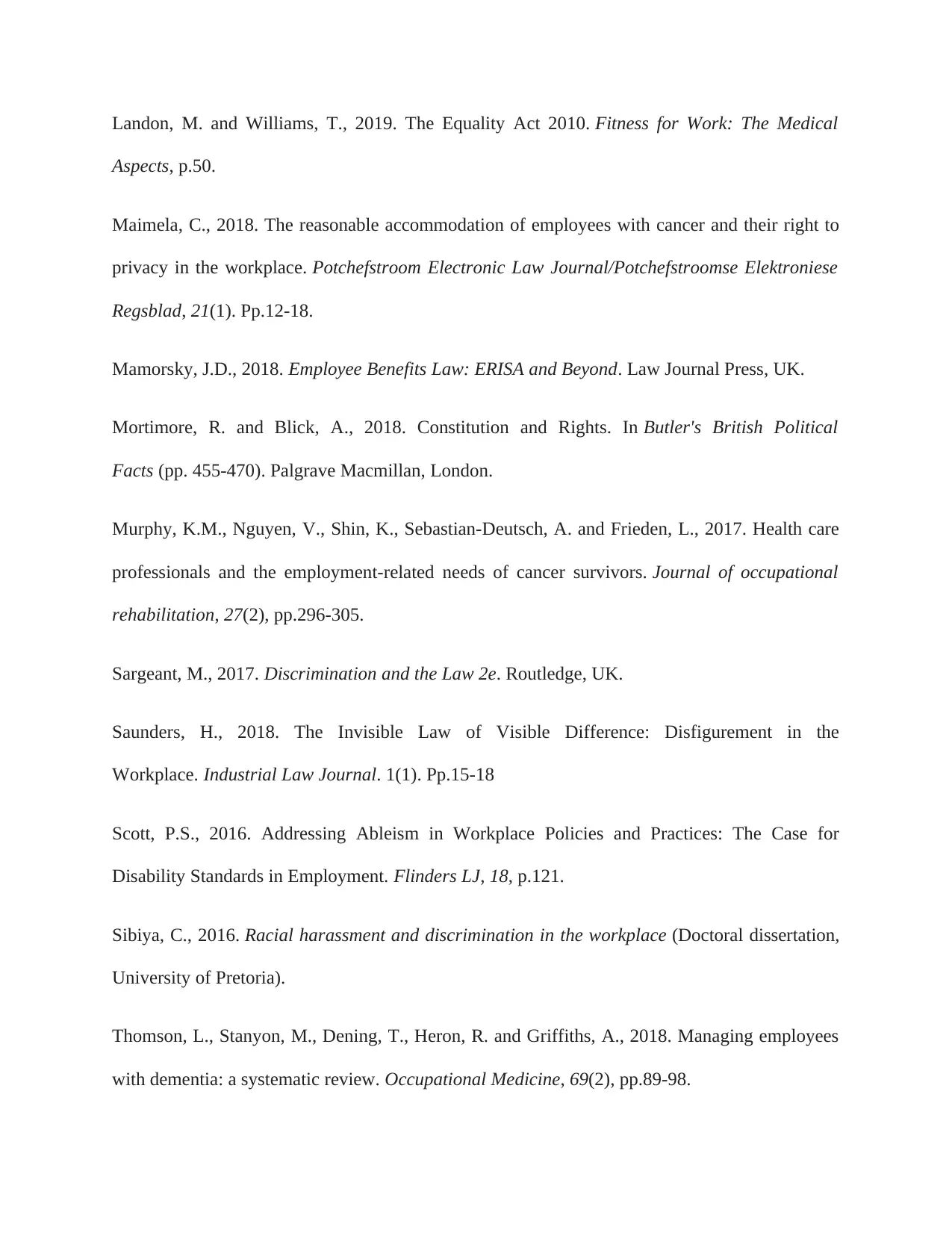
Landon, M. and Williams, T., 2019. The Equality Act 2010. Fitness for Work: The Medical
Aspects, p.50.
Maimela, C., 2018. The reasonable accommodation of employees with cancer and their right to
privacy in the workplace. Potchefstroom Electronic Law Journal/Potchefstroomse Elektroniese
Regsblad, 21(1). Pp.12-18.
Mamorsky, J.D., 2018. Employee Benefits Law: ERISA and Beyond. Law Journal Press, UK.
Mortimore, R. and Blick, A., 2018. Constitution and Rights. In Butler's British Political
Facts (pp. 455-470). Palgrave Macmillan, London.
Murphy, K.M., Nguyen, V., Shin, K., Sebastian-Deutsch, A. and Frieden, L., 2017. Health care
professionals and the employment-related needs of cancer survivors. Journal of occupational
rehabilitation, 27(2), pp.296-305.
Sargeant, M., 2017. Discrimination and the Law 2e. Routledge, UK.
Saunders, H., 2018. The Invisible Law of Visible Difference: Disfigurement in the
Workplace. Industrial Law Journal. 1(1). Pp.15-18
Scott, P.S., 2016. Addressing Ableism in Workplace Policies and Practices: The Case for
Disability Standards in Employment. Flinders LJ, 18, p.121.
Sibiya, C., 2016. Racial harassment and discrimination in the workplace (Doctoral dissertation,
University of Pretoria).
Thomson, L., Stanyon, M., Dening, T., Heron, R. and Griffiths, A., 2018. Managing employees
with dementia: a systematic review. Occupational Medicine, 69(2), pp.89-98.
Aspects, p.50.
Maimela, C., 2018. The reasonable accommodation of employees with cancer and their right to
privacy in the workplace. Potchefstroom Electronic Law Journal/Potchefstroomse Elektroniese
Regsblad, 21(1). Pp.12-18.
Mamorsky, J.D., 2018. Employee Benefits Law: ERISA and Beyond. Law Journal Press, UK.
Mortimore, R. and Blick, A., 2018. Constitution and Rights. In Butler's British Political
Facts (pp. 455-470). Palgrave Macmillan, London.
Murphy, K.M., Nguyen, V., Shin, K., Sebastian-Deutsch, A. and Frieden, L., 2017. Health care
professionals and the employment-related needs of cancer survivors. Journal of occupational
rehabilitation, 27(2), pp.296-305.
Sargeant, M., 2017. Discrimination and the Law 2e. Routledge, UK.
Saunders, H., 2018. The Invisible Law of Visible Difference: Disfigurement in the
Workplace. Industrial Law Journal. 1(1). Pp.15-18
Scott, P.S., 2016. Addressing Ableism in Workplace Policies and Practices: The Case for
Disability Standards in Employment. Flinders LJ, 18, p.121.
Sibiya, C., 2016. Racial harassment and discrimination in the workplace (Doctoral dissertation,
University of Pretoria).
Thomson, L., Stanyon, M., Dening, T., Heron, R. and Griffiths, A., 2018. Managing employees
with dementia: a systematic review. Occupational Medicine, 69(2), pp.89-98.

Vizard, P., 2016. The Human Rights and Equalities Agenda. Social Advantage and
Disadvantage, p.42.
Disadvantage, p.42.
1 out of 15
Related Documents
Your All-in-One AI-Powered Toolkit for Academic Success.
+13062052269
info@desklib.com
Available 24*7 on WhatsApp / Email
![[object Object]](/_next/static/media/star-bottom.7253800d.svg)
Unlock your academic potential
© 2024 | Zucol Services PVT LTD | All rights reserved.





